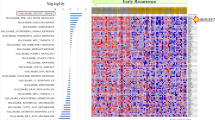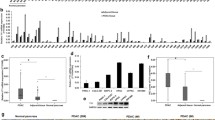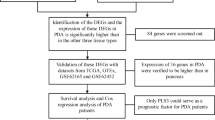Abstract
Lymph node (LN) metastasis is one of the most important adverse prognostic factors for pancreatic cancer. The aim of this study was to identify novel lymphatic metastasis-associated markers for pancreatic cancer. DNA microarray analysis was used to determine and compare the expression profiles of 17 pancreatic cancer tissues with LN metastasis and 17 pancreatic cancer tissues without LN metastasis. The microarray results were validated by real-time reverse transcription-polymerase chain reaction and immunohistochemistry. Only 58 genes were differentially expressed between the two groups with a difference in signal intensity ratio greater than a 1.5-fold change. Of these genes, 30 were significantly down-regulated in the LN metastasis group. Among five selected down-regulated genes for validation using real-time PCR, the expression of DST, FosB, RGS16, and CXCL12 was significantly lower in the LN metastasis group. Immunohistochemical analysis confirmed RGS16 and FosB underexpression in pancreatic cancer tissues with LN metastasis. RGS16 and FosB underexpression was associated with poor patient survival. Our findings show that RGS16 and FosB are underexpressed in pancreatic cancer with lymph node metastasis and associated with reduced survival, suggesting that RGS16 and FosB might be prognostic markers for pancreatic cancer.



Similar content being viewed by others
References
Raut CP, Tseng JF, Sun CC, Wang H, Wolff RA, Crane CH, et al. Impact of resection status on pattern of failure and survival after pancreaticoduodenectomy for pancreatic adenocarcinoma. Ann Surg. 2007;246:52–60.
Yamada S, Takeda S, Fujii T, Nomoto S, Kanazumi N, Sugimoto H, et al. Clinical implications of peritoneal cytology in potentially resectable pancreatic cancer: positive peritoneal cytology may not confer an adverse prognosis. Ann Surg. 2007;246:254–8.
Guidelines for the management of patients with pancreatic cancer periampullary and ampullary carcinomas. Gut. 2005;54 Suppl 5:v1-16
Ghaneh P, Costello E, Neoptolemos JP. Biology and management of pancreatic cancer. Postgrad Med J. 2008;84:478–97.
Hosokawa M, Kashiwaya K, Eguchi H, Ohigashi H, Ishikawa O, Furihata M, et al. Over-expression of cysteine proteinase inhibitor cystatin 6 promotes pancreatic cancer growth. Cancer Sci. 2008;99:1626–32.
Iacobuzio-Donahue CA, Ashfaq R, Maitra A, Adsay NV, Shen-Ong GL, Berg K, et al. Highly expressed genes in pancreatic ductal adenocarcinomas: a comprehensive characterization and comparison of the transcription profiles obtained from three major technologies. Cancer Res. 2003;63:8614–22.
Logsdon CD, Simeone DM, Binkley C, Arumugam T, Greenson JK, Giordano TJ, et al. Molecular profiling of pancreatic adenocarcinoma and chronic pancreatitis identifies multiple genes differentially regulated in pancreatic cancer. Cancer Res. 2003;63:2649–57.
Pawlik TM, Gleisner AL, Cameron JL, Winter JM, Assumpcao L, Lillemoe KD, et al. Prognostic relevance of lymph node ratio following pancreaticoduodenectomy for pancreatic cancer. Surgery. 2007;141:610–8.
Schwarz RE, Smith DD. Extent of lymph node retrieval and pancreatic cancer survival: Information from a large us population database. Ann Surg Oncol. 2006;13:1189–200.
Su SB, Motoo Y, Iovanna JL, Berthezene P, Xie MJ, Mouri H, et al. Overexpression of p8 is inversely correlated with apoptosis in pancreatic cancer. Clin Cancer Res. 2001;7:1320–4.
Su SB, Motoo Y, Iovanna JL, Xie MJ, Mouri H, Ohtsubo K, et al. Expression of p8 in human pancreatic cancer. Clin Cancer Res. 2001;7:309–13.
Hirono S, Yamaue H, Hoshikawa Y, Ina S, Tani M, Kawai M, et al. Molecular markers associated with lymph node metastasis in pancreatic ductal adenocarcinoma by genome-wide expression profiling. Cancer Sci. 2010;101:259–66.
Simeone DM, Ji B, Banerjee M, Arumugam T, Li D, Anderson MA, et al. Ceacam1, a novel serum biomarker for pancreatic cancer. Pancreas. 2007;34:436–43.
Hu Y, Xing J, Chen L, Guo X, Du Y, Zhao C, et al. Rgs22, a novel testis-specific regulator of g-protein signaling involved in human and mouse spermiogenesis along with gna12/13 subunits. Biol Reprod. 2008;79:1021–9.
Ross EM, Wilkie TM. Gtpase-activating proteins for heterotrimeric g proteins: regulators of g protein signaling (rgs) and rgs-like proteins. Annu Rev Biochem. 2000;69:795–827.
Chen C, Zheng B, Han J, Lin SC. Characterization of a novel mammalian rgs protein that binds to galpha proteins and inhibits pheromone signaling in yeast. J Biol Chem. 1997;272:8679–85.
Snow BE, Antonio L, Suggs S, Siderovski DP. Cloning of a retinally abundant regulator of g-protein signaling (rgs-r/rgs16): genomic structure and chromosomal localization of the human gene (vol 206, pg 247, 1998). Gene. 1998;217:187.
Davidsson J, Andersson A, Paulsson K, Heidenblad M, Isaksson M, Borg A, et al. Tiling resolution array comparative genomic hybridization, expression and methylation analyses of dup(1q) in burkitt lymphomas and pediatric high hyperdiploid acute lymphoblastic leukemias reveal clustered near-centromeric breakpoints and overexpression of genes in 1q22-32.3. Hum Mol Genet. 2007;16:2215–25.
Miyoshi N, Ishii H, Sekimoto M, Doki Y, Mori M. Rgs16 is a marker for prognosis in colorectal cancer. Ann Surg Oncol. 2009;16:3507–14.
Liang G, Bansal G, Xie Z, Druey KM. Rgs16 inhibits breast cancer cell growth by mitigating phosphatidylinositol 3-kinase signaling. J Biol Chem. 2009;284:21719–27.
Mittmann C, Chung CH, Hoppner G, Michalek C, Nose M, Schuler C, et al. Expression of ten rgs proteins in human myocardium: Functional characterization of an upregulation of rgs4 in heart failure. Cardiovasc Res. 2002;55:778–86.
Derrien A, Zheng B, Osterhout JL, Ma YC, Milligan G, Farquhar MG, et al. Src-mediated rgs16 tyrosine phosphorylation promotes rgs16 stability. J Biol Chem. 2003;278:16107–16.
Milde-Langosch K. The fos family of transcription factors and their role in tumourigenesis. Eur J Cancer. 2005;41:2449–61.
Ryseck RP, Bravo R. C-jun, jun b, and jun d differ in their binding affinities to ap-1 and cre consensus sequences: effect of fos proteins. Oncogene. 1991;6:533–42.
Bamberger AM, Methner C, Lisboa BW, Stadtler C, Schulte HM, Loning T, et al. Expression pattern of the ap-1 family in breast cancer: association of fosb expression with a well-differentiated, receptor-positive tumor phenotype. Int J Cancer. 1999;84:533–8.
Khanim FL, Bradbury CA, Arrazi J, Hayden RE, Rye A, Basu S, et al. Elevated fosb-expression; a potential marker of valproate sensitivity in aml. Br J Haematol. 2009;144:332–41.
Tarbe N, Losch S, Burtscher H, Jarsch M, Weidle UH. Identification of rat pancreatic carcinoma genes associated with lymphogenous metastasis. Anticancer Res. 2002;22:2015–27.
Wakita K, Ohyanagi H, Yamamoto K, Tokuhisa T, Saitoh Y. Overexpression of c-ki-ras and c-fos in human pancreatic carcinomas. Int J Pancreatol. 1992;11:43–7.
Author information
Authors and Affiliations
Corresponding author
Additional information
This work was supported by the Samsung Biomedical Research Institute grant # SBRI C-A9-226-1.
Rights and permissions
About this article
Cite this article
Kim, J.H., Lee, J.Y., Lee, K.T. et al. RGS16 and FosB underexpressed in pancreatic cancer with lymph node metastasis promote tumor progression. Tumor Biol. 31, 541–548 (2010). https://doi.org/10.1007/s13277-010-0067-z
Received:
Accepted:
Published:
Issue Date:
DOI: https://doi.org/10.1007/s13277-010-0067-z




